Stephen D. Morrison's Blog, page 19
May 24, 2014
Is Sanctification a Process or a Person?
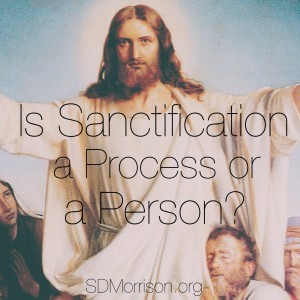 Sanctification is a subject of much debate within Christian circles. Recently, it has been in the news (Christian news, that is) due to the exit of Billy Graham’s grandson Tullian Tchividjian from the popular blogging website The Gospel Coalition. The reasons for his departure? It’s a complex issue, with two sides to the story, but on the one hand, a primary reason for the change is the way that Tullian Tchividjian understands sanctification. 1
Sanctification is a subject of much debate within Christian circles. Recently, it has been in the news (Christian news, that is) due to the exit of Billy Graham’s grandson Tullian Tchividjian from the popular blogging website The Gospel Coalition. The reasons for his departure? It’s a complex issue, with two sides to the story, but on the one hand, a primary reason for the change is the way that Tullian Tchividjian understands sanctification. 1
I don’t usually read too much from The Gospel Coalition, neither have I really followed this issue. However, I do like Tullian Tchividjian, and I value his grace-centered message. But in reading about this dispute, it has caused me to re-examine my perspective on sanctification. It also has made me realize that I have never actually expressed these views on this website. So I want to talk about sanctification: what it is, what it isn’t, and what all that means for our lives.
What is Sanctification?
Sanctification in the New Testament comes from the same Greek word for holiness. Which means to be set apart, or different. Therefore, sanctification takes place in the life of a believer when as they are set apart from the world, i.e. become holy. The question, then, and the division in theology, is when this happens. Is it instant? Is it a life-long process? How do we become sanctified?
There are therefore essentialy three elements to sanctification. 1) The immediate saving sanctification of Jesus, 2) the practice of sanctification in the believers life, and 3) the eschatological fulfillment of sanctification (when Jesus returns).
The question is, which of these are up to us, and what of these are gifts of grace? For most, both (1) and (3) are acts of sheer grace, through faith. However, the division primarily finds itself in number 2. So how do we, believers in Christ, live out our new nature, and the holiness of Christ?
Jesus is Sanctification
My question is this: why can’t all three be the same unified act of sanctification? Why must we divorce sanctification into three categories?
In my mind, sanctification is a once and for all deal; just as justification, redemption, and reconciliation are too done deals or “finished works” of Christ. If salvation is wrapped up in Jesus, and if Jesus is the author and perfecter of our faith, then wouldn’t it be safe to assume that Christ Himself is not just our salvation (i.e. our entrance into Christ) but also our sanctification (i.e. our continued life in Christ)? I think so.
Paul writes in 1 Corinthians 1:30, “And because of him you are in Christ Jesus, who became to us wisdom from God, righteousness and sanctification and redemption.” (ESV)
 Jesus Christ Himself is our sanctification.
Jesus Christ Himself is our sanctification.
So what then can we say about #2 of our three aspects to sanctification? If sanctification is Jesus Christ Himself, and if we are in Him, then is sanctification a life-long process of achievement? Are we fully in Christ, or only partially?
If we are truly in Christ, as the bible tells us we are, then are we not also partakers of Christ Himself? And therefore, if this is true, are we not partakers of His holiness?
I think we have to first see that the whole Gospel is wrapped up in Christ. It is not a transaction, or even an announcement: the Gospel is a person, the Man Christ Jesus. All that is good news, is wrapped up in Him. Therefore, salvation, reconciliation, new creation, and redemption are all realities that we partake of when we partake of Christ. Along with all this, we must to see that sanctification is included in Christ Himself, not apart from Him.
We cannot have a doctrine of sanctification that exists apart from Christ and His finished work. He is our sanctification. We therefore are not working our way into holiness by either faith or works. It is all Christ’s doing, all the way through. We partake of His sanctification, we do not earn sanctification in and of ourselves.
Becoming vs. Discovering
Sanctification therefore is Christ Himself. All that can be said about our sanctification must be said in the light of Christ, our union with Him, and our participation in His life.
Now, here is a distinction that must be made. Sanctification is still both a person and a process. However, it is not a process like many in the church seem to think it is. Sanctification is not a process of becoming holy. Sanctification is a process of discovering holiness already accomplished and given to us in union with Christ Jesus.
We do not become progressively more sanctified any more than we become more “in Christ” one day over another. We discover our sanctification more and more as we see Christ more and more. Sanctification is the process of seeing Christ and us in Him, and thereby seeing that we are new in Him: utterly sanctified and holy.
Christ Himself is our sanctification. He is our holiness. We are not left to sustain our lives out of our own self-efforts. It is through Christ’s life in us that we live. Breath in a deep sigh of relief: holiness isn’t up to you!
“Yet not I, but Christ…”
What do you think? Do you agree with my perspective on sanctification here? Leave me a comment below!
Like this article? Help me expand my reach by sharing:
Notes:
This article from CT sums it up pretty well. ↩May 23, 2014
Christianity is Biblical, but Biblicalism is Not Christianity
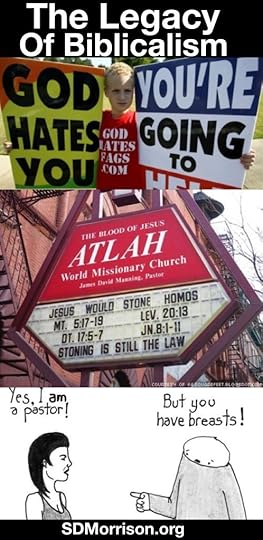
What is Biblicalism? Simply, I would say that Biblicalism is what happens when you value the bible over the Person of Christ.
In other words, Biblicalism is in some ways Christian, yet in other ways fiercely anti-Christian. It is similar to literalism, or fundamentalism, and most of the time, one and the same with each.
The best way to spot Biblicalism is by it’s legacy. The poster above outlines the outworking of Biblicalism in our culture.
Biblicalism is at the root of the Westboro Baptist Church. They use the bible to back up just about everything they do. They just miss the whole person of Jesus Christ, and His message of love, grace, and mercy. But, they have bible verses to justify their hatred!
Biblicalism is when this Harlem pastor writes his church sign to declare: “Jesus would stone homos.” Notice all the bible verses? Pure Biblicalism: valuing the bible, and your interpretation of the bible, over the person of Jesus, and the whole scope of the scriptures (which should always point to Jesus).
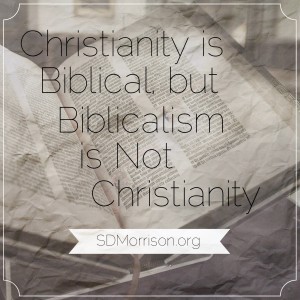 A probably more common way that Biblicalism effects the church is in the last photo. We have taken the freedom of Christ and added conditions to it. We have said, “well, Paul said women can’t speak! So..” But we have ignored 1) the cultural context behind Paul’s statement, and 2) the fact that Jesus constantly liberated and empowered women. (e.g. Who were the first to see Jesus after He rose from the dead?)
A probably more common way that Biblicalism effects the church is in the last photo. We have taken the freedom of Christ and added conditions to it. We have said, “well, Paul said women can’t speak! So..” But we have ignored 1) the cultural context behind Paul’s statement, and 2) the fact that Jesus constantly liberated and empowered women. (e.g. Who were the first to see Jesus after He rose from the dead?)
We have failed to take Jesus seriously.
He is the center of our theology, not an addition to our theology. Whenever we value a book over the person of Christ, we fall into error.
The bible does not take precedence over Christ, the bible gives witness to Christ. In and of itself, apart from Christ, the bible is not true at all. It’s barely even good philosophy in and of itself, but as soon as you add relationship, and the self-revelation of Jesus, then you have a formula for truth. The bible + Jesus = true. The bible divorced from Jesus is not true.
We are the disciples of Jesus, not the disciples of a book. We follow Him, not the strict legalistic formulas we can deduce from a 2,000 year old book.
We cannot think through our theology behind the back of Jesus, the eternal Word of the Father.
Would you agree? Have you seen the effects of Biblicalism? Leave me a comment below!
Like this article? Help me expand my reach by sharing:
May 21, 2014
Why I Love (and Hate) Joel Osteen
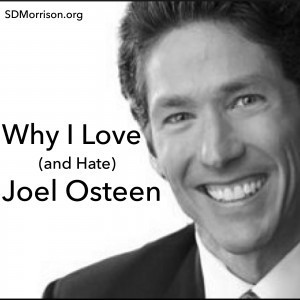 In all fairness, I don’t actually hate Joel Osteen. I hate what he tells us about the church and the Gospel today. But I’ll get to that.
In all fairness, I don’t actually hate Joel Osteen. I hate what he tells us about the church and the Gospel today. But I’ll get to that.
For now, let me tell you why I love Joel Osteen. For starters, I love his message, and I love his impact.
Joel Osteen brilliantly captures the heart of God for us: that we may have hope, have joy, and live life well. He has some incredibly encouraging statements that have spoken to me personally in just the right time.
Here are a few examples (taken from his twitter page and goodreads):
“Quit beating yourself up. You’re not a finished product. You are still a work in progress.”
“Don’t be so focused on what you want that you take for granted what you have. Enjoy the season you’re in.”
“Quit worrying about how everything is going to turn out. Live one day at a time; better yet, make the most of this moment. It’s good to have a big – picture outlook, to set goals, to establish budgets and make plans, but if you’re always living in the future, you’re never really enjoying the present in the way God wants you to.”
Joel Osteen gets a lot of heat from Christians; I get that. He’s not what I would consider a truly “biblical” preacher, nor is he my favorite. To be honest, I rarely listen or read much from him. But that is not to say that he’s bad, or that there is no value in his ministry. If God is the God of all hope, shouldn’t we celebrate someone who promotes hope? I think so. Therefore, I celebrate Joel Osteen for who he is, not for who he isn’t.
I enjoy his ministry, and I do recommend him, just not as the only source. If he’s the only preacher you listen to, that’s a problem. I think Joel Osteen is a good, encouraging; “pick-me-up” sort of preacher. I can certainly say that I’ve gone to his twitter profile a few times just because I knew I was feeling down and I needed a little hope. In that context, he’s a great gift to the world. I love him for these reasons: He brings hope, he’s encouraging, and He is impacting lives (people do get saved regularly through his ministry).
In my mind, Joel Osteen is good for the church today. Sure, he’s also rich, but so what? He helps far more people that way. He supposedly gives away millions of dollars every year. That’s a pretty big deal, and certainly a good thing by anyone’s standard.
Why I Hate Joel Osteen
Like I said, I don’t hate Joel Osteen the person. But what I hate is the truth that Osteen tells us about Christianity and the gospel.
Simply put, Joel Osteen proves that the Christian church must go beyond the gospel in order to find hope and encouragement. In other words, that the Gospel has lost its fundamental characteristic as “good news”. We have weighed it down by throwing in so much hell-fire, fear-based preaching that the Gospel does not encourage us anymore.
But it should. If we must go to preachers like Joel Osteen, and many do, to find encouragement, then this shows something is seriously wrong with our Gospel. The Gospel is not encouraging our hearts and bringing us hope as it should be, and therefore, people cling to Osteen for encouragement. Sure, our evangelical Gospel is “theoretically” hopeful and encouraging, but in reality it is just more of the same boring, religious do-it-your-self BS that’s plagued history.
If the Gospel was presented in such a way as it should be presented, as the good news of God’s outrageous love and grace for the human race revealed in Jesus, then we won’t need men like Joel Osteen. If we truly preached the gospel the way it should be preached, we would give the world a message they were born to receive. We need “Good News”, not bad news. We don’t need another minute of moralism, fundamentalism, or deism. We need the Gospel. We need the God who is not angry with us, but Who if for us.
This is why I am so passionate about redefining the Gospel as truly “good news”. The gospel is a glorious message, and when we turn it into a mixed bag of good and bad, it fails to be the Gospel at all.
We have taken the good news of Christ and turned it into the bad news of Christianity!
That is why I love (and hate) Joel Osteen.
Now I’d love to hear what you think. Do you like Joel Osteen? Have you read any books by him? Do you agree with my assessment? Comment below!
Like this article? Help me expand my reach by sharing:
May 18, 2014
Is the Bible Perfect? (It Doesn’t Really Matter)
 In 1978 the Chicago Statement on Biblical Inerrancy was published in reaction to biblical liberalism. It states that, “scripture is without error or fault in all its teaching…” 1
In 1978 the Chicago Statement on Biblical Inerrancy was published in reaction to biblical liberalism. It states that, “scripture is without error or fault in all its teaching…” 1
Biblical inerrancy has caused much debate, and there are many opposing and supporting arguments for and against its validity. Some say that the bible is perfect in every way, while others say it is inspired but fallible. It is in many ways considered “evangelical suicide” to disagree with Biblical Inerrancy.
Here, I have no interest in commenting on whether or not I believe in inerrancy. Ultimately, I don’t think it matters.
Let’s say the bible truly is perfect. So what? It’s not like you could read it perfectly.
If we could read the bible perfectly, then why do so many highly-educated people disagree over what it means? Why do so many PhD level scholars disagree so completely on things that should be obvious in a “perfect” bible?
At the end of the day, it doesn’t matter whether or not the bible is perfect. We cannot read the bible perfectly. If church history has taught us anything, it has certainly taught us this.
Karl Barth made an interesting statement that’s fitting here. In response to the Biblicalism he wrote this:
The Bible was now grounded upon itself apart from the mystery of Christ and the holy Ghost. It became a “paper Pope,” and unlike the living Pope in Rome it was wholly given up into the hands of its interpreters. It was no longer a free and spiritual force, but an instrument of human power. 2
Barth hits the nail on its head here in calling the protestant bible a “paper pope.” It has all to often become “an instrument of human power.” Here Barth says with such brilliance what I have felt for some time now about the way we approach the bible.
Manipulation?
 The bible may be perfect, and if it is, who’s job is it to interpret it? In other words, who is in charge of telling us what this perfect bible means?
The bible may be perfect, and if it is, who’s job is it to interpret it? In other words, who is in charge of telling us what this perfect bible means?
If we see that there is a difference between “my interpretation” and “bible perfection” then I think we’re okay. However, we often fail in seeing this. We say things like “well, the bible is pretty clear!” But is it, really?
Here’s an easy formula for manipulation. “The bible is perfect + my interpretation of the bible is perfect = what I say, God says. Disagree with me, you disagree with God.”
There is a very thin line here with incredibly dangerous ramifications. If “my interpretation” is equal to “God’s truth”, then I can manipulate, molest, and control anyone who will listen to me in the name of “just preaching the bible.”
No one “just teaches the bible.” Let’s be honest with ourselves for a moment. We teach “our interpretation” of the bible. To confuse interpretation for truth is to gravely error.
One look at history and you’ll see the danger in this. Christians used the bible to promote racism and slavery in America. Hitler used the bible to justify murder, war, and all the horrors of the holocaust.
Biblical inerrancy may be correct, or it may not be, but at the end of the day it doesn’t matter. No one is infallible. We all have subjective opinions; we rarely ever think objectively.
So let’s just be honest with ourselves. We are all learning and growing in God. None of us have arrived at “perfect theology.”
Therefore, be willing to listen to other perspectives, and be humble in sharing your own. Have conversations, not debates. Let’s not get dogmatic here! Be willing to learn from others, to explore different ideas, and to challenge what you believe.
Learn. Grow. Explore.
Now I’d love to hear what you think. Leave me a comment below!
Like this article? Help me expand my reach by sharing:
A great quote on the bible can be found here.
Notes:
Chicago Statement of Biblical Inerrancy ↩ CD I.2, p 525 ↩May 12, 2014
Our “Silent Storm”, His Happy Calm
 On Saturday night my wife and I watched the annual Eurovision Song Contest, cheering on our favorite song from the Netherlands (which ended up in 2nd place). For my American friends, Eurovision is a contest where each European country presents a song to compete against other nations. It’s a lot of fun, and focuses on the unity of Europe.
On Saturday night my wife and I watched the annual Eurovision Song Contest, cheering on our favorite song from the Netherlands (which ended up in 2nd place). For my American friends, Eurovision is a contest where each European country presents a song to compete against other nations. It’s a lot of fun, and focuses on the unity of Europe.
This year I was able to watch while actually living in Europe, which added an interesting aspect to everything. It made it quite enjoyable. During the show one song in particular, a song from Norway, caught my attention with it’s lyrics.
Watch here:
Lyrics:
“And there’s a silent storm inside me
Looking for a home
I hope that someone’s gonna find me
And say that I belong
I‘ll wait forever and a lifetime
To find I’m not alone
There’s a silent storm inside me
Someday I’ll be calm”
This song is powerful and filled with strong emotions. It’s about finding “home”, belonging, and being at peace.
It’s a beautiful portrait of what it’s like to be a human being. We, in many ways, live out our own “silent storms” of uncertainty, insecurity, and mortality everyday. We live in confusion, darkness, and brokenness.
In the Christian sense, it is into this silent storm that Christ came. If we take seriously the incarnation of Christ, we can see the stunning truth that God has came as man to live within our existence. To know, to feel, to understand our humanity deeply and fully. He came to live out our existence, in the thick of our darkness and fear, in order to bring us home.
Christ descends into our darkness in order to lift us up from out of it. Out of chaos into peace, out of rejection into acceptance, and out of fear into love. He takes our hurting and He brings it home into the very heart of God. He brings us home, to live within the Trinitarian life, where we belong.
Christ takes our silent storms of loneliness, and He shows us the we are never alone. He found us in our brokenness and He lifted us up to the place where we belong. He is the man who left it all behind just to find us, His lost sheep, in the far country. He finds us, lifting us up onto His shoulders, and carrying us back to where we belong.
We all know what it means to be a silent storm. All of us want to belong and to find our home. In the heart of God, in the innermost relationship between Father, Son, and Spirit, we are home, we are loved, and we are free to be fully alive.
We belong. We are not alone. We are home in the embrace of our Father. He comes and meets our “silent storm” with His happy calm.
This song is beautiful, and it wonderfully echoes the heart cry of Jesus to meet us all in our silent storms.
Like this article? Help me expand my reach by sharing:
May 8, 2014
On “Mere Christianity” and Trinitarian Thinking
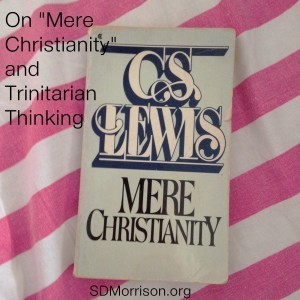 I’ve just finished reading C.S. Lewis’ book “Mere Christianity” today. I really enjoyed this book, but I also have a few thoughts on it.
I’ve just finished reading C.S. Lewis’ book “Mere Christianity” today. I really enjoyed this book, but I also have a few thoughts on it.
I think Lewis would have done much better if he had began with his understanding of the Trinity, and then proceeded to work out the rest of the book from there, rather than just tacking it onto the end. It’s still a great book, but it’s much like most of our modern day Christian ways of thinking. We often start by thinking through our concepts of God, salvation, and morality then we add on stuff like the Trinity. But what if we were to be strictly Trinitarian first, and then see all these other things in the light of the Trinity? Wouldn’t everything else have a much richer and fuller meaning if understood within a Trinitarian framework?
I think so, but sadly we have often done just what Lewis has done. We work out our doctrines apart from the Trinity, and then give a statement or two about it at the end. But the Trinity cannot be just a nice doctrine we add onto the end of our theology. If the Trinity is true, then it must be central. For if God truly is Trinitarian, then this is the deepest truth about who He is, and therefore, all that we say and think about Him must be said and thought out in a strictly Trinitarian way.
C.S. Lewis does do an excellent job here in describing the Trinity, however. He makes some truly stunning statements. For example: “It [the Trinity] matters more than anything else in the world.” (153)
And one of my favorite quotes from the book: “In Christianity God is not a static thing–not even a person–but a dynamic, pulsating activity, a life, almost a kind of drama. Almost, if you will not think me irrelevant, a kind of dance.” (152)
So I give him credit. Lewis at least gets around to the Trinity. Most Christian books never even get that far. But we should take the Trinity far more seriously. If it is true, and I believe it is, then we must rethink all of our ideas about God and life from this starting point. A Trinitarian theology does not just give lip-service to the Trinity. A true Trinitarian theology sees everything as a Trinitarian issue, and works out all theology from a strict Trinitarian perspective.
May we think more Trinitarian, and see what makes God so stunning and wonderful!
Like this article? Help me expand my reach by sharing:
If you want to learn more about what it means to “think Trinitarian” check out this podcast.
Have you read Lewis’ book? What did you think?
May 4, 2014
Hyper Legalism > Hyper Grace? No.
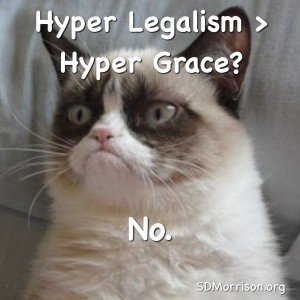 The so called “Hyper-Grace” message has been hailed as “the greatest deception of the 21st century.” Many prominent leaders have spoken out by writing books, and giving messages exposing this “great danger”. But is Hyper Grace really such a big deal?
The so called “Hyper-Grace” message has been hailed as “the greatest deception of the 21st century.” Many prominent leaders have spoken out by writing books, and giving messages exposing this “great danger”. But is Hyper Grace really such a big deal?
Hyper Grace may fall into error sometimes, but is it really fair to say that this is the greatest deception of our century?
No way!
In my mind, Hyper Legalism is a much greater deception. It is by far a more dangerous issue with more serious ramifications. Why isn’t Hyper Legalism being attacked with the same passion and forcefulness that Hyper Grace is?
Legalism emphasizes sin, morality, rule-keeping, self-denial, and self-righteousness. Legalism will burn you out, beat you up, and wear you down.
Hyper-Grace may be an error, but at least it’s a step in the right direction. It may be off in some places, but isn’t legalism more dangerous? When I look at the church I don’t see a place that needs more rules, stricter requirements, or higher standards. I see a place that needs more grace.
And it’s not just the church that needs more grace, the whole world needs grace. We all need an encounter with outrageous grace.
We need the kind of grace that throws wild parties for rebellious sons, lets debtors off the hook willy-nilly, and gives a full days wage for the drunk that shows up just before quitting time.
I think it is absolutely ridiculous to label Hyper-Grace the “greatest deception of the 21st century”. We need grace now more than ever before. In a world of performance, pressure, and perfectionism we need a grace that can give us rest, peace, and freedom.
 Sure, grace may get abused from time to time, but that is no reason to neglect it. And it is certainly no reason to add conditions to a grace that is always and forever unconditional.
Sure, grace may get abused from time to time, but that is no reason to neglect it. And it is certainly no reason to add conditions to a grace that is always and forever unconditional.
Grace is unconditional, and it is forever sovereign. Grace is extreme, outrageous, and wasteful. It has no conditions, no qualifications, and no strings attached.
Can you have too much grace? No. But you can definitely have too much legalism!
Grace and Sin
As far as I can tell, the main arguments against Hyper-grace tend to be the neglect of repentance, confession, and the conviction of the Holy Spirit. Essentially, that Hyper-Grace does not preach sin enough.
But grace does not neglect sin, grace destroys sin. Grace offers the only true freedom from sin. Religion, legalism, and morality can not do anything but make you feel guilty, depressed, and worthless. The only escape is the free-for-nothing grace that Christ gives to us.
I don’t think sin should be even a blip on the Christians radar. If Christ has dealt with sin once and for all, then why do we make such a big deal about it?
Growing up in church I know first hand how rampant sin focused preaching is. It’s as if grace is a drug on the black market!
My Christian life growing up primarily revolved around not sinning. It was not about the cross, nor was it about the love of God. My life revolved around trying to be a good person, trying to please God, and trying to follow His rules.
The problem with the church is not that we don’t preach sin enough. The problem is that we preach sin way too much!
I vividly remember the freedom and joy I experienced the first time I read a “Hyper-Grace” book. I can say with certainty that my life has never been the same since.
No longer am I sin focused; I am stuck on Christ and Him crucified.
 I have found freedom from Hyper-Legalism through Hyper-Grace. I may not have an argument for the validity of the grace movement, but I do have a life that was changed: my own.
I have found freedom from Hyper-Legalism through Hyper-Grace. I may not have an argument for the validity of the grace movement, but I do have a life that was changed: my own.
In my mind, arguing this issue is pointless. We could throw bible verses at one another or we could love one another. Sometimes you can do both, but in my experience you usually can’t love those you’re standing against.
If we are to error, let us error on the side of grace.
Our world is drowning in legalism, and it’s only hope is outrageous grace.
More grace, Lord!
What do you think about the “Hyper Grace controversy”? Leave me a comment below!
Like this article? Help me expand my reach by sharing:
April 26, 2014
On Christian Universalism
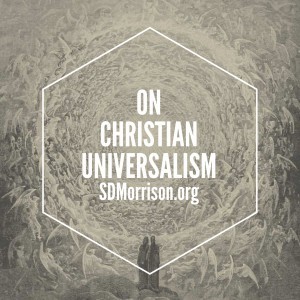 It’s probably about time that I be perfectly clear about something. There are several articles on here that I’ve written that have induced the label of “universalist” or “universalism” onto me. 1 My last two posts were pretty “universalist” feeling, and one of them even started an argument on Facebook about universalism. 2
It’s probably about time that I be perfectly clear about something. There are several articles on here that I’ve written that have induced the label of “universalist” or “universalism” onto me. 1 My last two posts were pretty “universalist” feeling, and one of them even started an argument on Facebook about universalism. 2
So to be perfectly clear, I am not a universalist. Which means:
1. I do not believe that all roads eventually lead to God/heaven. Jesus is the only way.
2. I do not believe that eventually everyone will be saved no matter what.
Although, to be fair, I do believe it is right to have some level of hope for this to be the case. The early church seemed to hold onto “hopeful” universalism (see Gregory of Nyssa), but not “dogmatic” universalism. That is, they seemed to hold on to the possibility of universalism, without holding onto it in strict dogmatic practice.
Ultimately, from what I’ve found to be true in scripture and in the early church, is that whatever happens on the other side of death is a mystery. None of us have the perfect revelation into either heaven or hell. Therefore, mystery should remain on the forefront of our minds.
It is an error on both sides of the spectrum to hold dogmatically the belief in either 1) universalism or 2) eternal damnation. To hold dogmatically to a belief that is not held dogmatically in the scriptures is an error. The bible seems to speak with a two sided tongue. There are plenty of scriptures that deal with universalism, and there are plenty of scriptures that deal with an eternal hell. Which ones would you prefer to cut out from the bible? 3
Much of the confusion, I believe, comes about due to my belief in the universal atonement of Christ. That one died for all, therefore all died. 4
While I whole heartedly believe that Jesus has finished the work of salvation for all people in all times and places, that does not mean I also believe in universalism. All have been included into the death, and resurrection of Christ. While some may interpret this to mean universalism, it simply isn’t the case.
It’s an error to infer a causal connection between the death of Christ including all mankind, and the state of an individual after death in either heaven or hell. No such connection is implied in the scriptures.
It is because our western culture is so eschatologically obsessed that we have made this connection. We have tied the Gospel completely with hell and therefore whenever we think of the cross we also think of hell. We think that Jesus died only to save us from hell. When scripturally, this is hardly the case. There is much more that Jesus accomplished for us. To limit the cross to a get-out-of-hell transaction is to disgrace the cross. 5
I’ve written this to bring clarity to what I write here on this website. I’ve already been accused several times of universalism, and so I wanted to be perfectly clear as to what I believe. Ultimately I don’t think the church should hold dogmatically onto one belief over the other. The Eastern Orthodox church has it right in this area. They tend to be far more mystical, allowing for God to do whatever God wants to do in spite of our ability to categorize it or figure it out.
Mystery. Mystery is key here, at least for me personally.
So in clarity, I do reject dogmatic universalism. But, I also reject many of the modern ways that heaven and hell have become dogmatically assumed into our theology. I hold both views as possibilities. While ultimately I trust that God is good, and He knows what He’s doing far more than I do.
This quote from Robert Capon pretty much sums up what I believe in regards to Christian universalism.
Like this article? Help me expand my reach by sharing:
Notes:
See specifically: What if All Means ALL?, Did Adolf Hitler Go to Hell?, and Do Homosexuals Go To Hell?. These in particular have generated accusations of universalism. ↩Although the article never once mentioned heaven or hell. It was solely about atonement, and our view of the human race in light of atonement. Read it for yourself here. ↩Here’s a great quote along these lines ↩See 2 Corinthians 5:14 ↩On what the cross accomplished, click here. ↩April 21, 2014
What if All Means ALL?
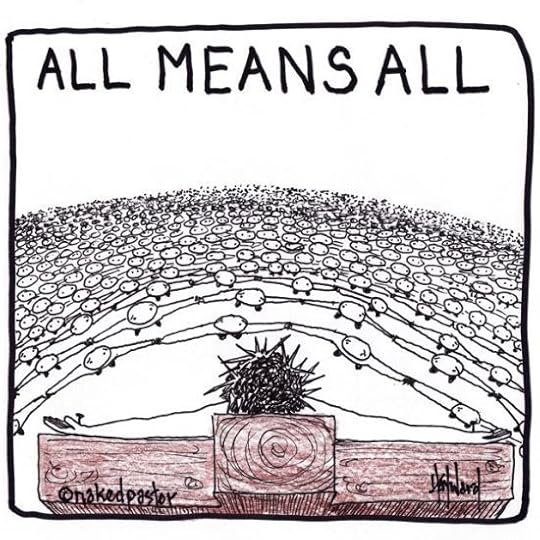
Via NakedPastor
What if all really means ALL?
What if we could actually see that all humanity is in the same boat?
That there are no outsiders to Grace.
That no one is excluded.
That there is no inner-circle with God.
What if we actually saw the whole world as having been reconciled?
Would we see brothers and sisters in the faces of our enemies?
Would peace be possible?
What if the homeless man you pass by on the street is just as close to God as you are?
What if the terrorists, the murders, the rapists, and the down-and-outs are actually all loved and treasured by God?
What if all really means all?
Can we take the bible seriously, that all humanity is in the same boat, included, and adopted into the family of God?
“God so loved the world …” 1
“I, when I am lifted up from the earth, will draw all people to myself.” 2
“Behold! The Lamb of God who takes away the sin of the world!” 3
“One died for all; all mankind died with Him.” 4
“…the Savior of all people, especially of those who believe.” 5
“He is the atonement for our sins, and not for ours only but also for the sins of the whole world.” 6
“…who gave Himself as a ransom for all“ 7
What if we stopped seeing the world as the outsiders, and started seem them as insiders who are simply unaware that they’ve been included?
What if we stopped seeing church as an exclusive club, and started seeing Christ in all of humanity?
“…there is not Greek and Jew, circumcised and uncircumcised, barbarian, Scythian, slave, free; but Christ is all, and in all.“ 8
Does all really mean ALL?
Like this article? Help me expand my reach by sharing:
Notes:
John 3:16 ↩John 12:32 ↩John 1:29 ↩2 Corinthians 5:14 ↩1 Timothy 4:10 ↩1 John 2:2 ↩1 Timothy 2:6 ↩Colossians 3:11 ↩April 20, 2014
10 Accomplishments of the Cross
 Thursday I began a series of articles (and a video) on Easter. I began by expressing what I feel are the ten ways we should rethink Easter. Today, on Easter sunday, in order to conclude this series here are 10 accomplishments of the cross.
Thursday I began a series of articles (and a video) on Easter. I began by expressing what I feel are the ten ways we should rethink Easter. Today, on Easter sunday, in order to conclude this series here are 10 accomplishments of the cross.
Enjoy meditating on the success of the cross as we celebrate the death, resurrection, and ascension of Jesus Christ today!
#1 Reconciliation
“God was in Christ reconciling the world to Himself.” – 2 Corinthians 5:19
Reconciliation involves God reaching us in the midst of our darkness and alienation. In the incarnation Jesus came and lived within our fallen existence and from that place He reconciled our fallen humanity back to God. As C. Baxter Kruger says, reconciliation involves giving us eyes to see and ears to hear. Jesus came to undo our fallen alienation and to reconcile us into fellowship with God.
#2 Freedom From Sin
“We know that our old self was crucified with him in order that the body of sin might be brought to nothing, so that we would no longer be enslaved to sin.” – Romans 6:6
On the cross Jesus freed us once and for all from the sin nature by crucifying it. The fallen sinful man died on the cross with Jesus and was left buried in the grave. On Holy Saturday we talked about our inclusion into the dead of Christ, and our being buried with Him. In the tomb, our sin and shame was forgotten for good. We are entirely free from sin.
#3 Dead Defeated
“Death swallowed by triumphant Life!
Who got the last word, oh, Death?
Oh, Death, who’s afraid of you now?”
-1 Corinthians 15:55 MSG
The death of the One who is Life Himself, means to undoing of the very fabric of death. Death has been robbed its power in the death of our Eternal Lord. Jesus reigns triumphant over death. The incorruptible Son of God, meets us in our death, and undoes that death. O death, where is your victory?
#4 New Life
“I have been crucified with Christ; it is no longer I who live, but Christ lives in me; and the life which I now live in the flesh I live by faith in the Son of God, who loved me and gave Himself for me.” – Galatians 2:20 NKJV
 Resurrection means new life. Resurrection means new creation. Resurrection means our old life is dead and gone, our new life has begun. We are new, sharing in the resurrection of Christ. Our new life is the very Life of the Son of God. We participate in the Life of the Son. He is our Life. New Life is Christ Jesus!
Resurrection means new life. Resurrection means new creation. Resurrection means our old life is dead and gone, our new life has begun. We are new, sharing in the resurrection of Christ. Our new life is the very Life of the Son of God. We participate in the Life of the Son. He is our Life. New Life is Christ Jesus!
#5 Forgiveness
“Then said Jesus, ‘Father, forgive them; for they know not what they do.’” – Luke 23:34
Forgiveness is a life giving pronouncement. Forgiveness imparts life. God forgives us out of sheer Grace and love. Jesus did not earn forgiveness for us. Jesus proclaimed forgiveness! The Father’s forgiveness is not wishful thinking, it is the reality that Jesus came to announce. We are forgiven by the sheer goodness and mercy of our Heavenly Father.
#6 Adoption
“For you did not receive the spirit of bondage again to fear, but you received the Spirit of adoption by whom we cry out, “Abba, Father.” The Spirit Himself bears witness with our spirit that we are children of God, and if children, then heirs—heirs of God and joint heirs with Christ, if indeed we suffer with Him, that we may also be glorified together.” – Romans 8:15-17
The eternal love-dream of God is to have us as His beloved children, adopted and included in His life. The Gospel announces our adoption into the very family of God. We have been included into the Trinitarian life of God, the inner relation between the Father, Son and Holy Spirit. No longer are we orphans, but sons and daughters of God.
#7 The Fall Undone
“But the free gift is not like the trespass. For if many died through one man’s trespass, much more have the grace of God and the free gift by the grace of that one man Jesus Christ abounded for many.” – Romans 5:15
Through one man, Adam, death and sin entered into the world. Through another man, Christ, the last Adam, grace and life overcame the world. The death of Christ undid the fall of Adam and restored the human race back from the pit of darkness and corruption.
#8 Seated in Heavenly Places
“But God, being rich in mercy, because of the great love with which he loved us, even when we were dead in our trespasses, made us alive together with Christ—by grace you have been saved—and raised us up with him and seated us with him in the heavenly places in Christ Jesus, so that in the coming ages he might show the immeasurable riches of his grace inkindness toward us in Christ Jesus.” – Ephesians 2:4-7
We have been included in Christ’s death, resurrection, and ascension. When He died, we died. When He raised, God quickened us to life with Him. When Jesus ascended to the right hand of His Father in heaven we too were seated in heavenly places, and given participation in the very Triune life of God Himself. The stunning news of the Gospel is not just that Jesus died to forgive us, but that Jesus died to include us in His life.
#9 Healing
“…by His stripes we are healed.” Isaiah 53:5

#StuffJesusNeverSaid
Our brokenness is healed by His brokenness. When Christ entered into our fallen existence He healed it. By taking part in our suffering, He imparted healing to our humanity. As St. Gregory of Nazianzus said, “The unassumed is the unhealed.” It is through the perfect union of Christ with out fallen humanity that our fallen humanity takes part in His healing and wholeness.
#10 Sanctification
“But by His doing you are in Christ Jesus, who became to us wisdom from God, and righteousness and sanctification, and redemption.” – 1 Corinthians 1:30
Sanctification is not a process we embark on, it is a gift. Actually, more accurately, sanctification is a person. It is Christ Himself, and our participation in His holiness and righteousness, that is our sanctification. Through the cross and our union with Christ we have received a perfect sanctification. We have been made righteous and new! No longer sinners, we are saints!
As we celebrate Easter, may we humbly and reverently praise God for His infinite goodness.
It is finished!
Like this article? Help me expand my reach by sharing:



